27.01.2022

An artist's illustration of the evolution of the interstellar object 'Oumuamua, whose weird, elongated shape may have come from tidal forces. (Image credit: YU Jingchuan from Beijing Planetarium)
Could we send a spacecraft to the giant, cigar-shaped interstellar interloper 'Oumuamua? Should we?
In 2017, astronomers detected a space rock from another solar system whizzing through our cosmic neighborhood for the first time ever. The rock, called 'Oumuamua, passed us by and sailed through our solar system leaving behind questions that remain to this day. Is 'Oumuamua an alien ship? Just a weird comet or asteroid? Two years later in 2019, astronomers spotted another interstellar visitor, Comet 2I/Borisov, passing through the solar system. However, this comet was more similar to objects in our solar system, so 'Oumuamua has remained a mystery.
But with a new initiative, some researchers think that they could answer some of their lingering questions about the interstellar object by actually sending a mission to catch up with 'Oumuamua.
A group of volunteer researchers from the Institute for Interstellar Studies (i4is), a U.K.-based nonprofit company, has proposed sending a spacecraft to 'Oumuamua with what they call Project Lyra. The project began very soon after 'Oumuamua was discovered with the intent to determine if it was even possible to send a craft to the object and, in following work, the team has investigated different possible ways to study the rock up close.
According to the group's latest paper, which was published Jan. 13 to the preprint server arXiv, a spacecraft launched in 2028 could use the gravity from Jupiter and the sun to help propel itself and catch up to the interstellar space rock in 26 years or so.
The team's proposed method relies on something called an oberth maneuver. Often known as "gravity assists," oberth maneuvers are planned flights that use the gravitational pull of large objects like the sun or planets to help pick up speed. Their method would use a Jupiter oberth maneuver to gain enough speed to leave the solar system in the direction of the space rock.
However, a maneuver like this with Jupiter has never before been done and therefore has a low Technology Readiness Level (TRL) rating, Universe Today reported.
Although this specific maneuver is still just an idea, the team hopes that such a mission could help us to better understand exactly what 'Oumuamua is. While some scientists have claimed that it could be some sort of intelligent extraterrestrial ship, it remains a novelty that could help scientists to better understand the nature of space rocks like asteroids and comets.
'Oumuamua was initially suspected to be an asteroid, then some scientists later claimed it was actually a comet, and some think it could be some form of "cosmic iceberg." While the true nature of 'Oumuamua is still a mystery, it remains true that 'Oumuamua has traits of both comets and asteroids and is unique among objects spotted in our solar system.
Quelle: SC
